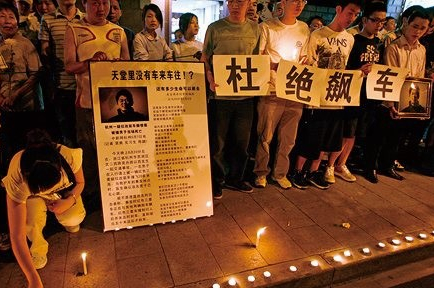Beijing's underground racing scene has largely managed to stay under the radar. But the death of a 25-year-old pedestrian during a race brought the issue out of the back roads and into the spotlight.
When a modified Mitsubishi sports car ran over a 25-year-old man Tan Zhuo in Hangzhou, east China's Zhejiang Province, Beijing's underground racing scene lost its time out of the spotlight. The death of Tan Zhuo brought street racing out of the back roads and into the headlines.
|

|
|
Relatives and friends prayed for Tan Zhuo on May 8, 2009. |
Street racing never dies in Beijing, according to a racing insider. Racers shift the tracks from downtown loop roads to suburban fifth and sixth ring roads and highways.
Hu Hao, who directs Beijing Shuangyi Car Club, calls this group of people professional street racers. "They come out late at night. Fewer cars but more vigilant, usually their bets are not money, but the cars they drive and race."
"They never go to downtown roads for fear of being caught by police. Taking no interviews and very low-key, majority of them are private businessmen in their 30s and their everyday entertainment switches between the gentlemen's game of golf and the extreme sport of street racing," said a source close to a circle of people who regularly race on sixth ring road. He only provides his surname as Miao.
Each member of the circle owns at least one modified car, costing over 200,000 yuan (US$29, 255). They gather at night in groups of four or five on the sixth ring road or Beijing-Chengde Highway (BC Highway), which has more lanes and less traffic. They imitate professional racers and invite judges, according to Miao.
"They offer their modified cars as stakes in the bet. Once lost, nobody will hesitate or grudge handing out their cars, thinking they can win them back in the next race," Miao said about the several races in which he participated.
They also race in off-road rallies. Miao, who professes having a crush on cars since he was 17 and was considered the best driver among his friends, said he lagged far behind other racers in off-road rallies in China's Jiangsu Province.
"Screaming and shocking," Miao says about a race on BC Highway he witnessed early this year. A Volkswagen Jetta, normally not one of the best racing cars, reached 230 kilometers an hour, nearly double of the road's speed limit of 120 km/h.
Street racing history in Beijing dates back to 2001. The sport, although not acknowledged by any authorities, gained its popularity quickly among car fanciers and modification fans in two or three years. Street racers haunted Beijing's ring roads, downtown streets, racetracks and the Yizhuang industrial area.
These people are connected by car clubs, auto modification workshops and online groups, Hu Hao said.
The sport peaked in 2005. Racers started Internet threads, issuing challenges and organizing races on second ring or third ring roads. The more the traffic, the more popular the road was as a race route. As many as 40 modified cars would gather for a race, according to a racer surnamed Hu, who dropped out of the circle after being injured in a race five years ago.
Back in 2006, street racer Chen Zhen became famous overnight, getting arrested and being held in police custody for seven days for "endangering public security."
Chen was the representative of a special racing circle, in which members were all in their early twenties and were obsessed with finishing the second ring road as quickly as possible. It was a major game that most car-modification fans were infatuated with at the time.
Chen finished the 32.87 km second ring road in 13 minutes, earning him the nickname "13-Minute Boy." That kind of time means a speed of at least 151 km/h, on a major downtown road with heavy traffic and a maximum speed limit of 80 km/h. The nickname was later bestowed on any racers who could accomplish that time.
Chen's arrest is a watershed event for underground street racers.
"After that event, I asked my friends to hang out or go to pubs for a drink, they'd say ok, but if I called up a race, nobody came," said Xie Yang, one of the few in the circle who is still racing on the streets.
"Before that, my cab was often overtaken by speeding cars," said a taxi driver named Wang, "Now it is rare to see that on downtown roads."
"The golden days of street racing are gone," Xie sighed. He likes to race on streets between 11 p.m. and 4 a.m. Once he sees roadsters or modified cars running away from the nightclubs, he chases them, inviting a race.
Racing costs him two tanks of gasoline every night and several thousands of yuan in speeding tickets. He has met a number of people while pursuing races, including the traffic cops checking for drunken drivers in the spots he frequents.
Xie says racing on streets is more fun than on tracks. "On regular tracks, you use few kinds of vehicles and compete with people you are familiar with after a couple of competitions. But on the streets, the situation changes every moment, every day. You will meet every possibility, fresh and exciting."
(China.org.cn by Zhang Yunxing June 16, 2009)